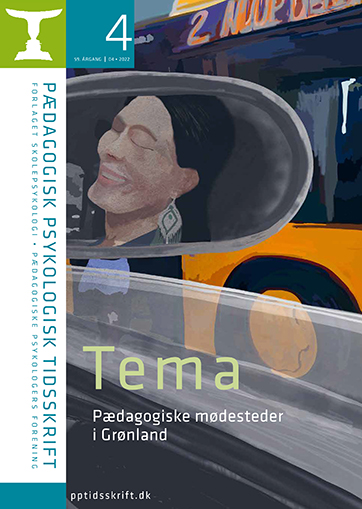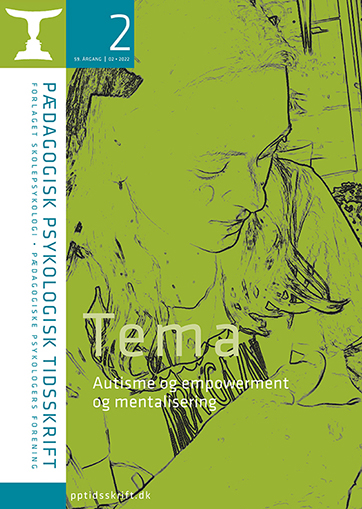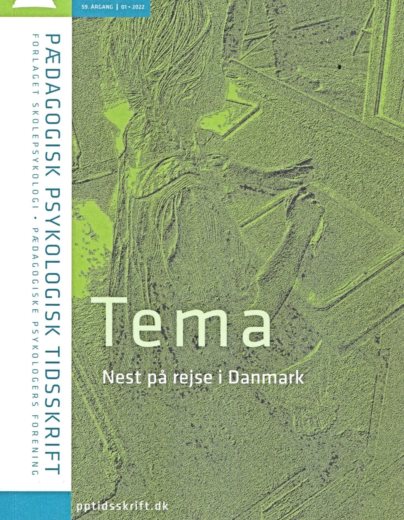Beskrivelse
Establishing modern childhood in Greenland
By Anders Øgaard & Ida Adolfsen Arnfjord
This article focuses on the changes in perspectives towards Greenlandic children in the late colonial era after 1945 . We discuss challenges in what is termed a lack of cultural sensitivity throughout the Danish Administration’s ambition to cast children in the role of forerunners in the modernisation of Greenland . This entailed a strong emphasis on the Danish language and a westernised way of thinking about child-rearing and education, and uncovering what appears to be a lack of examples of pedagogical discussion throughout the modernisation of childhood . We touch upon the early attempts to establish daycare institutions, which were solemnly ba- sed on a Danish and European way of thought . The area of daycare institutions is currently governed by Greenland’s Self Rule government, which will lay the grounds for a more culturally founded understanding of childhood in the future .
Using cultural traditions, hunting and nature in special classes – an outdoor school that motivates
By Kirsten Føns
This article presents and discusses a case study of a school class for children with special needs in a Greenlandic primary school, where education outside the class- room (EOtC) is practised by using hunting and other traditional use of Greenlandic nature as a foundation for interdisciplinary teaching . The students live in a resi- dential institution because they have been exposed to neglect and traumatic events at home, which has resulted in them being relocated from their family and home- town and having to change school . The study examines how students respond to school when hunting, the Greenlandic dog sledge, traditional use of Greenlandic plants and other Greenlandic traditions are integrated into the school’s lessons . Ob- servation and interviews show that this form of teaching motivates students and positively impacts their academic performance and social and personal develop- ment . Mastery experiences, authenticity, a smooth room and positive relationships between teacher and student, as well as between students are important elements in this positive experience of school . The research can provide inspiration for peda- gogy in the Greenlandic primary school that creates motivation and interest in school .
History of the orphanage – the first 100 years
By Bonnie Jensen
The article is based on the thesis ”Barndomshjem eller børnehjem?” (Childhood home or Children’s home?) . There are 24 residential institutions in Greenland to- day, and around 4 .5% of the children are placed in out-of-home care, approx . half in residential institutions and the other half in foster homes . The number of these placements is significantly higher than the placements in comparable countries . The article aims to shed light on the last 100 years’ approach to placing children in out-of-home care and discuss if there is another, better way of doing it, e .g ., Kinship foster care .
When student teachers design their own teaching
By Kirsten Føns, Agnete Klitsø Blicher, Lisa Korneliussen and Kamilla Frimodt Madsen
The Trainee Teacher as Educational Designers development project was initiated in 2018 at the Teachers’ Training College (TTC) at the University of Greenland, aiming to increase the trainee teacher competencies as educational designers with a focus on teaching adults . During the project, trainees were involved in planning, executing and evaluating teaching at TTC and participating in trainee teams’ re- flections and conversations . The project was based on the assumption that teaching competence is developed through reflections at three competence levels, cf . Erling Lars Dale, and that students’ motivation is increased when three basic psychologi- cal needs are met, cf . The Self-Determination Theory . The findings presented in this article are based on 41 trainees’ answers in a standardised qualitative evalua- tion form and the four authors’ reflections on the project . The trainees’ answers were analysed based on Constructing Grounded Theory . The trainees’ answers un- derlined six categories: Group work, Teachers’ competencies, Dissemination pro- motes professional understanding, Language of instruction, Peer to peer, Body and learning and Second order pedagogy, indicating which educational design compe- tencies the trainees were developing through the project; relational competence, classroom management competence and educational design competence, respective- ly . The project also contributed to the development of teacher identity and in- creased the trainee teachers’ ability for reflection, both in relation to their own learning, different roles in group work, the teaching of fellow trainees, as well as re- flections on second-order pedagogy . The project allowed for co-creative teaching and an open framework for the educational design, which increased the trainee teach- ers’ competencies and motivation .
Nr. 4 – 2022 131
Traces of bullying
By Helle Rabøl Hansen
In 2019, the Greenlandic government decided to develop a national strategy against bullying in the field of education: daycare, schools and secondary education . The strategy was adopted in 2022, and this article presents findings from ethnographic fieldwork made as preparation for the development of the strategy . The ambition is to shed light on central conditions for the development of bullying patterns . Furthermore, the article points out negative conflict spirals, challenges in school and postcolonial difficulties as central aspects in the discussions and understanding of bullying . The writer has subsequently participated in the creation of the strate- gy .
”You know very well that I never have any money for you.”
By Steven Arnfjord
This article is based on a case about homelessness and poverty, which unfolds into a social policy issue concerning the individualisation of social problems in Nuuk . The case revolves around shouts and rejections from people begging in Nuuk, which challenges the middle class’s perception of collectivism as a natural redistribution of resources . Recent research points to a possible popular understanding of social problems as self-inflicted . The article draws on years of research on homelessness and poverty in Greenland . From a social policy perspective, it is analysed whether an increased focus on social justice can contribute to strengthening the understand- ing of social problems as structural and not individual . It is argued that an active social policy is important, which engages the resourceful classes in supporting citi- zens on the margins to live a life they (people on the margins) deem meaningful . Collectivism is challenged but can still be a strategic response to homelessness through embedded socio-political democratic understanding across classes . Political and academic work must be done to communicate about the conditions and circum- stances in which people in homelessness and poverty live . If we look at Greenland as a welfare society, people on the margins must be able to be accommodated and understood in order for, as well as to prevent the structures that are also causing social problems .
Atuarfitsialak – ”The good School 2.0”
By Per Lykke Søndergaard
While referring to the academic theses of several Inuit intellectuals in Greenland, this article discusses how the profound reasons for children and youngsters’ refusal to go to school and opting out must be found in the breakdown of the Inuit genera-
tional contract and the fact that the original Inuit knowledge system has too little space in the Greenlandic school system . The article argues that the Inuit genera- tional contract must be re-established by talking with children and youngsters and revitalising the Inuit knowledge system, which then must become integrated into the further development and framework of Atuarfitsialak – The Good School .
Dialogue and learning – an educational-psychological project in Green- land: Siunissaq
By Peter Berliner & Elena de Casas Soberon
The article presents Project Siunissaq, which has existed since 2013 and is still in full swing as a learning project . Siunissaq is Greenlandic and means (the) future, and it aims to create social sustainability together with young people in local commu- nities in Greenland . The theoretical basis and methodical approach are described, and the article presents and reflects on the educational-psychological philosophy of the project . It is argued that learning is done through social support, trust, appreci- ation, human dignity, and equality in the learning environment . The project’s goal is to create collective self-determination through a holistic understanding and trusting relationships as social action learning . Documentation is provided for the young people’s assessments of the learning in the project .



